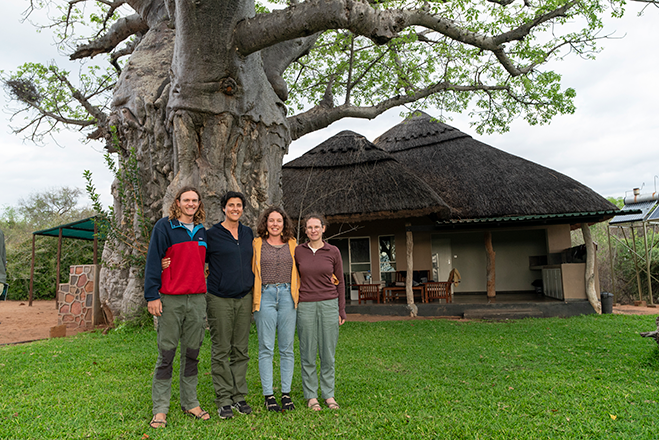By Joey Clarke, AWC Senior Science Communicator
A group of Australian Wildlife Conservancy’s (AWC) leaders travelled to Zimbabwe to take part in a training initiative which is nurturing a generation of effective conservationists.
There are distinct echoes of the Kimberley in the vast landscape of Gonarezhou National Park in the south-east of Zimbabwe. With towering sandstone cliffs and arid bushland dotted with baobab trees, this is also a site of ambitious conservation partnerships. Unlike the Kimberley however, Gonarezhou is home to a booming population of 11,000 elephants, as well as leopards, zebras and monkeys.
It was in this landscape that a group of young leaders came together in October 2023 as part of a program to cultivate the next generation of conservationists. Supported by the Oak Foundation, the Effective Conservation Training Initiative was devised by Spanish expert Ignacio Jiménez, who has surveyed best-practice conservation programs around the world to pinpoint exactly what works. Jiménez quite literally wrote the book on effective conservation.
“Managing effective conservation programs is extremely challenging,” he says. “Conservationists need to combine ecological science with psychological and organisational knowledge, and to manage people across different cultures while living in very remote areas. There is a real shortage of professionals who have that broad experience to be effective conservation leaders.”
 Elly Gearing/AWC
Elly Gearing/AWC
The program at Gonarezhou was designed to help address that shortage, and four of the world’s leading conservation organisations were invited to nominate up-and-coming leaders to take part. AWC’s Dr Pippa Kern, Dr Rachel Ladd and Braden Riles represented AWC. They were joined by representatives from African Parks, Frankfurt Zoological Society, and Rewilding Argentina. After an initial period of online study and discussions, the group spent two weeks together on-site at the national park for leadership workshops and mentoring.
For Dr Rachel Ladd, this was her first trip to Africa. “I’ll admit I occasionally got distracted by the antelope wandering past out the window,” she said. In her role at AWC, Rachel leads a team of ecologists at Scotia Wildlife Sanctuary and Mallee Cliffs National Park in south-west New South Wales. “This is the first time I’ve had to manage a team, and there’s a lot to learn. It was great to connect with people facing similar challenges and share some different methods.” While Rachel normally oversees reintroductions of bettongs and bandicoots, at Gonarezhou she was swapping stories about translocating elephants, jaguars and giant anteaters.
For Dr Pippa Kern, who heads up AWC’s science program at Yampi Sound Training Area in the Kimberley (where AWC works in partnership with Dambimangari People and the Department of Defence), the initiative inspired new ways of thinking about the value of conservation to communities and partners. “One of the ideas that I’ve been grappling with is pairing conservation outcomes with social development and community outcomes. We heard a lot about this from the people working in Africa and South America and it’s helped me refocus on that aspect of our work in Australia. Wherever you are, conservation is all about the people.”
 Rafael Abuín/Oceano Estudio Creativo
Rafael Abuín/Oceano Estudio Creativo
The AWC trainees were also struck by some of the challenges faced by their counterparts in other countries. Poaching is a widespread concern, and some of the attendees must work simultaneously as both conservationists and law enforcement agencies.
Braden Riles, AWC Operations Manager at Yampi, said the initiative was invigorating. “One thing I’ve brought back is energy. It was so good to be reminded that we’re not alone; I still keep in touch with some of the other participants. For me, the experience really topped up the tank.”
Following the success of the training initiative, planning is underway for a second round later this year. AWC is proud to take part.
Read or download this full issue of Wildlife Matters here.
Your donation can support AWC in future initiatives
Donate Now